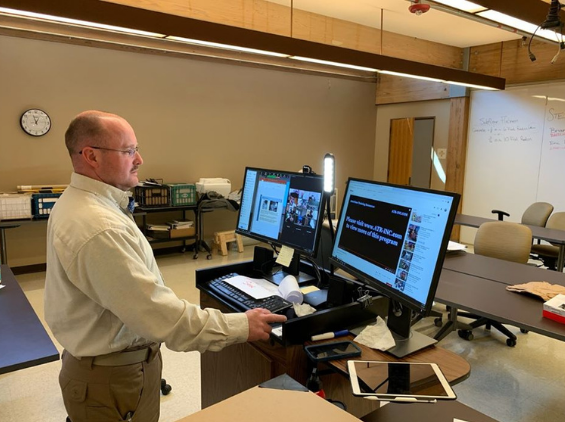A strong union needs skills, benefits and ACTION!

In addition to reliability and consistency, a key to the success of our training programs is being responsive. When a contractor needs a crew to get up to speed on something for a pending project, the curriculum can be developed promptly, and the class can be scheduled as needed and where it’s required.
That flexibility helped the UBC and the North Atlantic States Training Fund rapidly respond to the COVID-19 pandemic.
As the reality of the pandemic started to spread, the Carpenters International Training Center (CITF) went to work, creating a COVID-19 awareness program that was quickly adopted by the North Atlantic States Carpenters Training Fund (NASCTF). The online program was both timely and convenient. It provided members with reliable and clear information about the virus and how they could protect their worksites and their health. It allowed members to use the program individually, whenever it was convenient for them and whether they were still actively working or out of work for safety reasons.
“The COVID-19 awareness certification is a great example of what our training program, backed by the CITF, can do for our members and our employers,” said Tom Fischer, Executive Director of the NASCTF. “It was developed quickly in response to a critical need; it was high-level, usable information; and we were able to present it in a professional, accessible way.”
The program was so well received that the union was asked to share it with the industry, and did. Outside groups, including other trades and contractors who didn’t have the resources to develop their own programs, took advantage of the UBC program to keep themselves and their work-sites safe.
NASCTF and CITF didn’t stop there. They began encouraging use of the ICRA 8-hour awareness program, which is also offered online. ICRA–Infection Control Risk Assessment–is a 24-hour classroom and shop certification program that trains members to understand and minimize the risks of working in or contaminating active health care facilities or other “clean” construction sites. The 8-hour shop portion, which teaches hands-on use of hard/soft walls, negative air machines and other controls, was not available because training centers were closed. But the 8-hour awareness program provides an advanced level of knowledge that was valuable as the public health crisis progressed.
At the same time, Fischer and his staff were keeping an eye on overall training. They started working on and scheduling online training for an increasing number of apprenticeship and certification classes.
“The online classes have been really popular and will remain a permanent part of our training,” Fischer said. “The convenience of members being able to attend a scheduled class from anywhere they have an internet connection has led to a renewed interest in career development among many of our members. We’ve got members signing up for classes they might not have otherwise.”
The final piece has been turning the Career Connections program–a 4-year high school carpentry curriculum implemented by partner vocational schools and BOCES–from a textbook program into an online learning system. The evolution of Career Connections to an online system had been in the works, but when it became available this summer, it was a welcomed development for schools and instructors struggling with advancing their virtual learning programs.